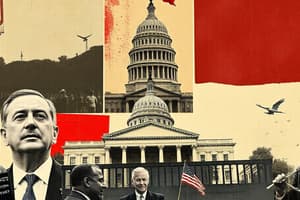Podcast
Questions and Answers
What does pluralist theory emphasize in the context of democracy?
What does pluralist theory emphasize in the context of democracy?
- A balanced competition among various interest groups. (correct)
- The complete control of the state by the bourgeoisie.
- The dominance of a single entity in political decision-making.
- The concentration of power in a small elite group.
Which theory posits that a small group of wealthy individuals controls political decisions in democracies?
Which theory posits that a small group of wealthy individuals controls political decisions in democracies?
- Elite Theory (correct)
- Marxist Theory
- Pluralist Theory
- Democratic Centralism
According to Marxist theory, who primarily holds political power in capitalist societies?
According to Marxist theory, who primarily holds political power in capitalist societies?
- Interest groups
- The working class
- The general populace
- The ruling economic class (correct)
What is a key difference between pluralist theory and elite theory?
What is a key difference between pluralist theory and elite theory?
In which theory is the state viewed primarily as serving the interests of capitalists?
In which theory is the state viewed primarily as serving the interests of capitalists?
What is the definition of government?
What is the definition of government?
Which type of authority is based on long-standing customs and practices?
Which type of authority is based on long-standing customs and practices?
What characterizes participatory democracy?
What characterizes participatory democracy?
In liberal democracies, what is primarily emphasized?
In liberal democracies, what is primarily emphasized?
What is a defining characteristic of popular authoritarianism?
What is a defining characteristic of popular authoritarianism?
What type of authority is associated with leadership qualities and personal appeal?
What type of authority is associated with leadership qualities and personal appeal?
How is power characterized in a legal-rational authority system?
How is power characterized in a legal-rational authority system?
What differentiates a monarchy from a liberal democracy?
What differentiates a monarchy from a liberal democracy?
Flashcards are hidden until you start studying
Study Notes
Basic Concepts
- Government: Authority structure overseeing laws, order, and resources within a political unit.
- Political Power: Ability to sway governmental policies influenced by political parties and interest groups. Can be categorized as legitimate (authority) or coercive.
- Social Movements: Collective actions organized to incite or resist social, political, or economic transformations.
Democracy
- Power resides with the populace, enabling citizen participation directly or via elected representatives.
- Participatory Democracy: Encourages active citizen engagement beyond mere voting, often seen in grassroots movements.
- Monarchy: Governance system led by a monarch, traditionally inherited; modern forms may limit power constitutionally.
- Liberal Democracies: Elected representatives make decisions for citizens, emphasizing individual rights, rule of law, and political pluralism, exemplified by nations like the U.S. and U.K.
- Popular Authoritarianism: Dominance by a leader or party with public support, characterized by restricted political opposition and limited citizen engagement.
Power and Authority
- Max Weber's Types of Authority:
- Traditional Authority: Rooted in customs and historical practices, typical in monarchies.
- Charismatic Authority: Based on an individual's attractive leadership qualities, as seen in figures like Gandhi.
- Legal-Rational Authority: Power derived from legal frameworks, focusing on established laws rather than individual leaders, common in modern democracies.
Who Rules? Theories of Democracy
- Pluralist Theory: Power spread across various groups, preventing monopolization of political influence; competition among interest groups promotes diversity in representation.
- Elite Theory: A small, affluent elite exerts control over political decisions, overshadowing democratic processes and the will of the general populace.
- Marxist Theory: Political power within capitalist societies is held by the bourgeoisie, serving capitalist interests rather than the working class.
Studying That Suits You
Use AI to generate personalized quizzes and flashcards to suit your learning preferences.




